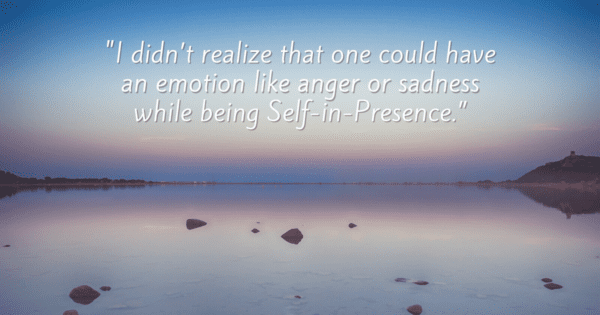Families can be great! But family relationships can also feel like sticky webs of guilt and obligation.
I know mine did. It wasn’t until I learned Focusing at age 22 that I began to realize how tangled up my “very nice” family was.
In my family growing up, people rarely asked for anything directly, so there was little chance to have a clean conversation about requests. Instead, hints and indirect communication were used to convey “how it was.” Obligations and wants were jumbled up together without a clear sense of who they belonged to.
I remember a Sunday morning in December. I was home for the holidays after learning Focusing, and my mother came to my bedroom door. “Are you going to church with us?” she asked.
I was aware – perhaps for the first time ever – of how that simple question threw me into agonizing paralysis. Do I have to say Yes? Do I have a choice? How much does this matter to her? What will happen if I say No? All that, but not nearly as articulately as that, passed through my head.
And then in my head, I heard the kind voice of my Focusing partner, simply saying, “Hm!” Suddenly all that I was feeling became OK to feel. I now had a space where my own side of things mattered, and could be felt. I did not want to go to church!
I said so, and my mother looked sad and disappointed… I thought. But, in that moment, I realized that her possible sadness and disappointment were not my fault, not my job to fix. They were hers.
It wasn’t always easy after that. My tendency to believe that other people’s feelings were my responsibility returned, especially in my marriage. But that inner space where I could know what I felt and wanted to do, separately from what others wanted me to feel and do, kept growing steadily stronger.
Is it ever like that for you?
Our families can be the hardest place to disentangle our own feelings and desires, our obligations, other people’s needs, other people’s feelings and desires.
Do you ever feel unsure and confused amid all that? Do you feel guilty when a family member is disappointed or angry? Is it hard to feel the difference between wanting to give and having to give?
Until we can separate out our own feelings and needs from the unspoken obligations that surround us, we can’t set the boundaries we need. And boundaries don’t just mean saying “No.” In later years, I went to church with my mother many times… because I wanted to share what mattered to her. I wanted to. Having shifted, I was not only free to say No, but also to say Yes.
If you’d like some help, I’ve got an exercise for you. Shall we try it?
A Helpful Exercise
- Take your time to settle into body awareness. Become aware of your breathing, and feel your body supported by what you’re sitting on right now.
- Remember a relationship where you are unsure about what you feel, or what you have a right to say no to, especially when you are with that person. Imagine you are with that person now, and notice if it is hard it is to know what you feel and want.
- Somewhere in your body, imagine that you have a safe space where your own feelings and wants can live and be known. A kind of inner sanctuary. In this inner safe space, your own feelings are protected from anyone, inside or out, who might say they are not OK.
- Recall that relationship you thought of earlier. Is it easier to know and sort out your own feelings and wants when they are protected in your inner safe space? Just notice.
What did you discover? How did it feel to give your feelings and wants their own inner space? And how do you feel now?








